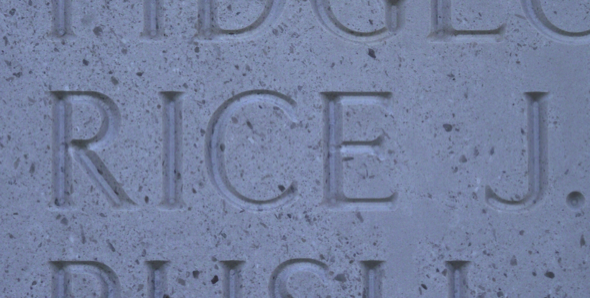John Rice was born in Cumberland, son of a Chelmsford-born electrical engineer, and emigrated with his family to South Africa when aged one. Following the death of both of his parents there he lived with his step-grandmother in Springfield. Later he worked at Hoffmann’s bearings factory in the town, lodging in Navigation Road. He joined the Territorial army and after the outbreak of the war agreed to serve overseas. In August 1915 he arrived in Gallipoli where he was killed in action within a week of his arrival. A brother was also killed in 1915.
RICE, JOHN*,
Serjeant, A Company, 1/5th Battalion, Essex Regiment
In August 1914 Jack was serving 1/5th Battalion of the Essex Regiment where he rose to become Serjeant 2241. The battalion was a Territorial unit formed in 1908 with its headquarters in Market Road, Chelmsford, and it naturally contained many Chelmsford men who were to lose their lives in the war. Jack had joined the Battalion prior to September 1909. The term ‘territorial’ indicated that the volunteers such as Jack who served with the battalion were under no obligation to serve overseas, with their focus on home defence, but many like him agreed to serve abroad after the declaration of war on 4th August 1914.
At the outbreak of the war Jack’s battalion and the other Territorial battalions that formed the Essex Brigade were half way through their fortnight’s annual training at Clacton. On 3rd August 1914, the day before war was declared, Jack’s battalion was initially ordered back to Chelmsford, but that was countermanded and the battalion marched for Dovercourt that afternoon. The following day mobilization papers were issued to all ranks and the battalion was alloted part of a pre-arranged defensive line west of Dovercourt.
On 9th August 1914 the battalion was sent to Brentwood. It did not stay there long, moving to north-east Norfolk by the end of the month. In April 1915 it moved to West Bergholt, before transferring to St. Alban’s in Hertfordshire the middle of the following month. By then the battalion, along with three other Essex Territorial battalions formed the 161st (Essex) Brigade in the 54th (East Anglian) Division. The majority of the period since the outbreak of the war had been spent training in expectation of foreign service.
From St. Alban’s the battalion travelled to Devonport by train, and departed on board the S.S. Grampian on 23rd July 1915, with a somewhat depleted strength of 29 officers and 649 other ranks. Its ultimate destination was to be Gallipoli, Turkey to join the Allied forces participating in the campaign against the Turks which had started on 25th April 1915.
Stops were made at Malta and Alexandria in Egypt, before sailing to Mudros Bay on the small Greek island of Lemnos. From there the battalion sailed towards Gallipoli, transferred to flat-bottomed boats and were put ashore at A Beach, Suvla Bay on 9th August 1915 as reinforcements to troops that had landed there over the previous three days. There were no casualties in Jack’s battalion, which moved inland on the evening of 11th August 1915 to fill a gap in the line between the 53rd and 10th Divisions. The next morning the battalion occupied the reserve line. At 5.55 p.m. on 14th August 1915 the battalion, with comrades from the remainder of the 161st Brigade, moved up to relieve the 163rd Brigade which had established themselves close to the village of Anafarta Ova. A post-war account on the battalion recalled:
“The advance of the 161st Brigade in daylight earned the admiration of Australian troops watching it from Anzac. the 5th Essex were in the centre, with the 6th [Essex] and 7th [Essex] on the flanks. It was the baptism of fire for the Brigade and though they were met with a furious fusillade as the advanced steadily over the plain, there was no hesitation. The Battalion reached the line and worked all night consolidating the position.”
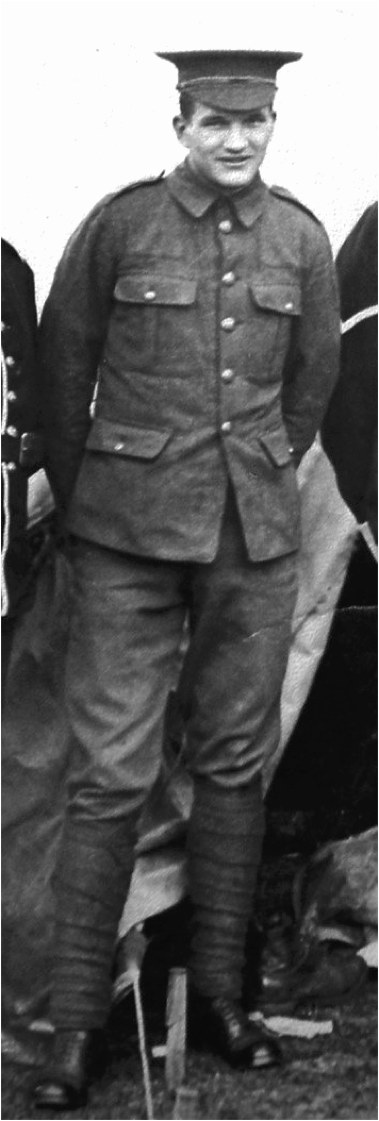
John, usually known as ‘Jack’, was born in Keswick, Cumberland around 1892, the son of the electrical engineer William Henry Rice and Betsy Rice (nee Hockley). Stanley’s father had been born in 1865 in Chelmsford; his mother in 1859 in Mashbury.
The couple had married on 3rd October 1887 at St. John the Evangelist Church in Lambeth, London. At the time Jack’s father was a 22 year-old electrical engineer resident at 3 Catherine Street, Lambeth. His mother was 28 and lived in Chelmsford. Jack’s father had begun working for the electrical engineers Crompton & Company in 1879. Jack’s grandfather was the engineer at Chelmsford Gaol.
Jack had two brothers born in England: Leonard George Rice (born in 1888 in Eastbourne, Sussex), and Stanley Rice (born in 1889 also in Keswick)
In the early 1890s Jack’s father went to South Africa to work as an engineer in the gold mines, but suffered from poor health.
On 1st July 1893 Jack, his mother and two brothers set sail for Cape Town, South Africa on board the ship Dunnottar Castle to join up with their father.
Whilst in South Africa Jack’s mother gave birth to a third brother, Cecil Ernest Rice (born in 1895 in Johannesburg, South Africa).
Jack’s mother died in South Africa from ‘fever’ and as a result Jack and his brothers returned to England. While on board the ship that brought them back Jack’s brother, Leonard, won a cup for winning quoits.
The children became orphans when their father died in South Africa in 1899. News of the death of Jack’s father appeared in the Essex County Chronicle on 25th November 1898:
“Death of Mr. W. Rice. Mr. W. Rice who went abroad last month after attending the funeral of his father, the late Mr. G. Rice, died of internal haemorrhage within a week of landing at Cape Town, He leaves four young children,, who are now living in Springfield. His wife pre-deceased him.”
In 1901 the census found nine year-old Jack living with his paternal step-grandmother Jane Rice
(widowed second wife of his grandfather), a cousin and boarder at 16 Randulph Terrace in Springfield (today’s 277 Springfield Road). Meanwhile his brothers, Stanley, aged 12 and Leonard, aged 13, were listed as a pupils at the British Orphan Asylum in Eton, Buckinghamshire. Family tradition recalls that Jack did not go to the orphanage due to ill-health.
In 1911 the census recorded Jack and his brother Leonard boarding at 21 Navigation Road in Chelmsford, the home of the bricklayer Arthur Allen and his wife Selina. Jack was a tool a gauge grinder at Hoffmann’s bearings factory in Chelmsford. Leonard was a clerk. Jack played football for Hoffmann Athletic for several seasons.
Jack was a talented boxer and once won the a Silver Bowl for the Southern Counties. Two months after the census Jack participated in Chelmsford’s celebrations for the Coronation of King George V. Representing the Hoffmann Athletic Club he fought a four-round exhibition boxing match against G. Royffe of the Marconi Athletic Club. According to the Essex County Chronicle ‘a spendid competition was awarded to Royffe on points.’
In March 1912 Jack participated in the annual boxing competitions of Hoffmann Athletic Club at the Shire Hall in Chelmsford. The Essex County Chronicle reported:
“ J. Rice (Hoffmann's) v. J. Wates (Plumstead). This six-round contest was one of the best of the evening, arid after some clever sparring, Rice gained a popular victory by unexpectedly knocking out his opponent in the fifth round. The two started with some good straight hitting, of which Wates had the better, and Rice's clever guarding kept him from severe punishment. Wates adopted an open style, going largely for the body, but Rice kept to a close defence and attacks on his opponent's head. Wates had the better of the second and third rounds but in the fourth, a hot bout, he suddenly collapsed and came in for a good pasting about the face. He went down, but struggled to his feet as the timekeeper called "eight." "Time" directly afterwards brought welcome relief. In the fifth round Wates was soon in difficulties, but he fought gamely, although palpably pumped, and the contest was stopped and awarded to the local man, who came for an ovation, while genuine applause was also awarded the defeated.“
Jack is pictured, below in 1912 in a charity football team, raising money for the Titanic Fund (3rd from left in top row).
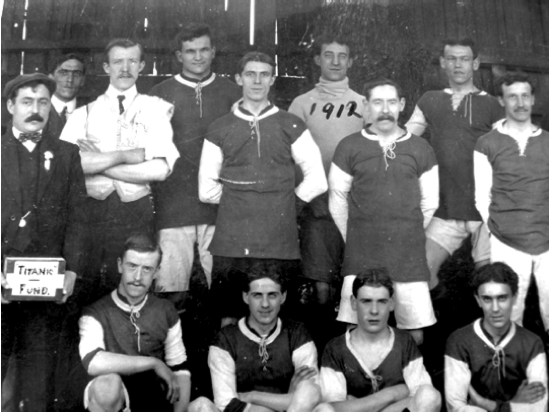
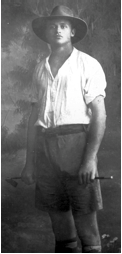
Another post-war account continued:
“At dark there was a considerable uncertainty as to the situation on our right and the patrol work was particularly difficult. One patrol was unfortunately ambushed, and 2/Lieut. Turner, the leader, and Sergt. Rice were killed, but two men made their way back under heavy fire. Turner was an old ‘Artists’ Rifleman. He had served in France and had not been with us long, but had made himself deservedly popular. Rice was an old comrade and the steadiest of non commissioned officers. During the night the relief took place and the battle-worn 163rd got out of the line without incident.
‘Sgt. Rice’ was Jack Rice whose death in action was subsequently reported to have occurred in the early hours of 15th August 1915. He was 22.
Jack’s brother Stanley Rice had died from wounds three months earlier, on 14th May 1915, in France. News of both brothers was reported on 24th September 1915 in the Essex County Chronicle:
“Gunner Stanley Rice, R.H.A., of Chelmsford, killed in action in France, was one of four orphan brothers serving. A brother, Sergt. J. Rice, 5th Essex, is reported missing at the Dardanelles. All four were well-known athletes, excelling at boxing, football. etc.”
Jack has no known grave and is commemorated by the Helles Memorial in Turkey. Jack’s and Stanley’s names are not among the 359 remembered by the Civic Centre Memorial, Chelmsford.
The same edition of the Essex County Chronicle which reported Jack going missing also included the following article:
““LADY SNIPERS. Miss O. Willsher, of Greengates. Radlett. Herts. has received a letter her brother, Drummer F. Willsher, of the 5th Essex, now in the Dardanelles. Writing of the first time the 5th went under fire, he says their conduct under a hail of shot and shell was marvellous, and one the " boys" from had the courage to run back and pick up his ration bag winch he had dropped.
At dusk on the day of advance entrenched themselves, and a party, which included Jack Rice, of Chelmsford, volunteered to go out to ascertain the enemy's movements. The snipers, says Drummer Willsher, are the worst. They (the Turks) have even got lady snipers. One woman was caught with a dozen British identity discs round her neck. and half a dozen pay books and over £5 worth of English money upon. One wounded Turk on being brought in exclaimed. "Me have fight; German officers shoot," meaning he had to fight or German officers would shoot him.
The Drummer is enthusiastic about the New Zealanders and Indians who, he says. are the boys to fetch out sniper; they seem enjoy the sport. An Indian had his mule shot by a sniper. He was soon out after him, and in less than half an hour the Indian came proudly into camp with the sniper's head under his arm.
Drunmer Willsher relates many narrow escapes from shell and rifle fore that he has experienced, including being hit by the screw of a shrapnel, and the smashing of his water bottle by a bullet. He concludes ‘with respects to all the boys at home late of 5th Essex Service Battalion.’”
Jack’s brother Cecil (pictured above left) also served in the army, as Private 2640 in the Australian Infantry Force, having been sent to Australia before the war. He joined up in June 1915, embarked from Brisbane two months later and served in Gallipoli and France where he was wounded in 1916. He was returned to Australia the following year, was a talented golfer, and ran a business.
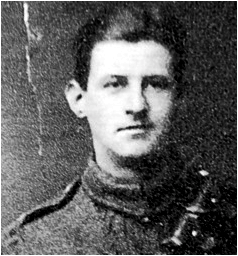
Their brother Leonard, pictured left, also served in the army during the war, and later worked as an accountant before rejoining the army. Leonard excelled at cricket, and is thought to have played for Essex at one time. He was also a talented swimmer and diver and died in 1957.
151118
